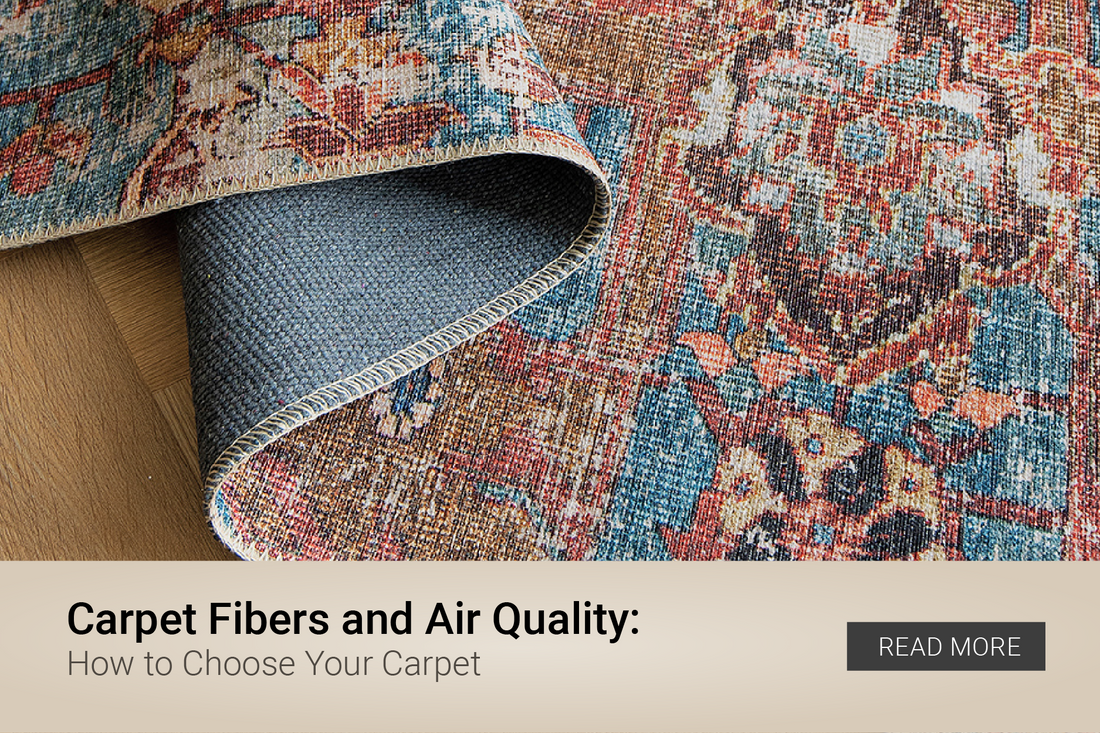When we think about the benefits of carpets, we often go straight to their aesthetic appeal – the warmth, colour and comfort that carpets bring to an interior. But did you know that carpets can also offer air quality benefits?
In this blog post, we’ll look at the impact of carpets on indoor air quality (IAQ) in your home. Read on to discover how carpets can contribute to a healthier living environment, and find out how to choose and maintain your carpets for optimal air quality.
Carpet Air Quality Benefits
Rugs and carpets can impact the air quality inside your home in a number of different ways. Let’s break it down:
• Trapping Airborne Particles – Carpet fibres trap airborne particles such as dust, pollen and pet dander. They prevent pollutants from circulating in the air, and reduce the contaminants that people might inhale. As a result, carpets can help with allergy control.
• Reducing Volatile Organic Compounds (VOCs) – VOCs are gases emitted by common household products such as paints or disinfectants. Exposure to VOCs can have adverse effects on your health, but certain types of carpets, especially carpets made from natural fibres like wool, have been found to absorb them effectively.
• Humidity Control – Carpets can help control humidity levels within a room by absorbing and retaining moisture. This prevents the growth of mould and mildew.
Carpet Fibers and Air Quality: How to Choose Your Carpet
The right carpet can make all the difference when it comes to improving the air quality in your home. How to maximise the benefits of carpet for allergy sufferers? Choose a carpet with a low pile, which will harbour fewer allergens than a high-pile rug. It’s also a good idea to seek out eco-friendly carpets made from natural fibers such as wool.
Carpet Maintenance Tips
Your carpet will only help with air quality if you take care to maintain it properly. Carpet fibres are great for capturing pollutants like dust and pet dander; however, when you walk over your carpet, you risk releasing these contaminants back into the air. So it’s essential to vacuum your carpets regularly to remove pollutants, and to have them professionally cleaned from time to time. It’s also important to ensure good ventilation throughout your living space to help prevent mould.
Conclusion
Looking to buy carpets online to help enhance the air quality in your interior? Discover a comprehensive range of area rugs and runners at Carpet Centre. Our collection of floor carpets for the home includes stylish designer carpets, luxurious silk carpets and classic designs inspired by Iranian carpets. Browse our collection and find your dream carpet here.
FAQs
Do carpets contribute to better indoor air quality?
Yes, carpets can help improve indoor air quality by trapping airborne particles, absorbing VOCs and helping to reduce humidity.
How do carpets affect allergen levels in the home?
Carpets can trap allergens such as dust mites and pet dander in their fibres. Regular cleaning and vacuuming are essential to keep these allergens under control.
What is the most effective way to improve indoor air quality?
Maintain your carpets with regular vacuuming and cleaning, and ensure proper ventilation, to improve indoor air quality.
Is carpet better for allergies?
Many types of carpet can be beneficial for allergies if they’re maintained properly. Low-pile carpets are good choices.
Are carpets okay for people with asthma?
This very much depends on the individual, but properly maintained carpets can be suitable for people with asthma. Regular cleaning is crucial.
What types of pollutants can carpets trap?
Carpets can trap a variety of pollutants, including dust, pollen and pet dander, as well as absorbing VOCs.
